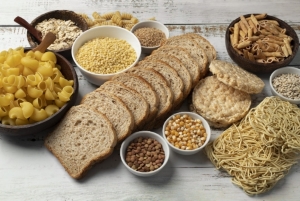The alarm rings, heralding the start of a new day. You stretch, ready to tackle that early morning workout that’s become your cherished ritual. But then it hits you—your stomach feels as empty as your inbox on a Sunday morning. Should you grab a quick bite, or power through on an empty tank? This daily dilemma is something almost all fitness enthusiasts have faced at some point in their journey.
Welcome to one of the most intriguing debates in the fitness world: Should you eat before or after a workout if your goal is to lose weight?
We’ll dive deep into the science behind pre-and post-workout nutrition while sprinkling in relatable anecdotes and practical tips. The aim? To provide you with a balanced perspective, make an informed choice tailored to your unique body and fitness goals.
Whether you’re an avid runner trying to shed those last few pounds or a newbie stepping into the gym for the first time, this article is designed to offer clarity amidst the chaos.
The Science of Eating Before a Workout
-
Carbohydrates as Fuel
 Imagine your body as a finely-tuned car — what kind of fuel does it need to run efficiently, especially when you’re about to zoom through a strenuous workout? Enter carbohydrates, the high-octane gasoline in our metaphor. When you consume carbs before exercise, they break down into glucose and provide that immediate, easily accessible energy your muscles crave during those intense sweat sessions.
Imagine your body as a finely-tuned car — what kind of fuel does it need to run efficiently, especially when you’re about to zoom through a strenuous workout? Enter carbohydrates, the high-octane gasoline in our metaphor. When you consume carbs before exercise, they break down into glucose and provide that immediate, easily accessible energy your muscles crave during those intense sweat sessions.
Think of it like this: you wouldn’t embark on a long road trip with an empty tank, right? Similarly, giving your body essential carbs before hitting the gym ensures that you have enough reserves to power through. Studies have shown that carbohydrate intake is particularly beneficial for high-intensity exercise like sprinting or weight lifting because it keeps glycogen stores topped up.
-
Protein for Muscle Protection
 Now let’s turn the spotlight on protein, our trusty muscle guardian. While carbs are busy being your energetic sidekick, protein steps in to act as the muscle protector. Eating protein before you exercise helps prevent muscle breakdown by providing amino acids—the building blocks for repairing and growing muscles.
Now let’s turn the spotlight on protein, our trusty muscle guardian. While carbs are busy being your energetic sidekick, protein steps in to act as the muscle protector. Eating protein before you exercise helps prevent muscle breakdown by providing amino acids—the building blocks for repairing and growing muscles.
You’re doing resistance training, grunting through sets of deadlifts and squats. During such exertions, tiny tears appear in your muscle fibers (don’t worry — this is normal!). A pre-workout helping of protein ensures that amino acids are readily available to swoop in and repair these micro-tears more efficiently.
-
Insulin Sensitivity
 Here’s where things get slightly more technical but stick with me—it’s worth it! In basic terms, insulin sensitivity refers to how responsive your cells are to insulin’s call to absorb glucose from the bloodstream. When you eat before working out, especially something packed with carbs and proteins, it affects both insulin response and blood sugar levels.
Here’s where things get slightly more technical but stick with me—it’s worth it! In basic terms, insulin sensitivity refers to how responsive your cells are to insulin’s call to absorb glucose from the bloodstream. When you eat before working out, especially something packed with carbs and proteins, it affects both insulin response and blood sugar levels.
Increased insulin sensitivity means your body handles nutrients more effectively post-exercise—you’re essentially “priming” yourself for better nutrient uptake later on. This metabolic benefit can make workouts feel easier and aid recovery faster—a win-win situation!
What Should You Eat Before Working Out?
Aim for a small meal or snack roughly 30 minutes to 3 hours before exercising (you may need some trial-and-error here, every stomach has its personality!). Ideally:
- Complex Carbohydrates: Think oats or whole grain toast which slowly release energy.
- Lean Protein: Examples include Greek yogurt or an egg.
- Optional Fats: Avocados can provide sustained energy without feeling too heavy.
And remember—stick with foods easy on digestion! Nothing worse than regretting yesterday’s leftover chili while you’re halfway through spin class!
The Benefits of Eating Before a Workout
-
 Improved Performance
Improved Performance
Ever had one of those magical workout days where you felt unbeatable like you could run an extra mile or push through more reps without breaking a sweat? Chances are, you probably fueled up correctly before hitting the gym. Eating before working out isn’t just about staving off hunger, it’s about releasing a torrent of energy that propels you to new personal bests.
Carbs provide immediate fuel, while protein ensures everything stays intact and functioning smoothly. Research shows that athletes who consume pre-workout nutrition demonstrate better endurance, strength, and overall performance compared to those who exercise on an empty stomach.
Greater Muscle Preservation
Here’s where our story gets very real: When you’re on a weight loss journey, the aim is to shed fat — not precious muscle. Maintaining muscle mass is crucial because it keeps your metabolism revving even when you’re at rest. Think of muscle as your metabolic powerhouse.
Eating before exercise supplies your muscles with the necessary nutrients to prevent them from being broken down for energy during strenuous activity. Pre-workout proteins are especially beneficial here—they offer a reservoir of amino acids that act almost like bodyguards for your muscles, ensuring that they get nourished rather than cannibalized.
Imagine lifting weights knowing you’ve got this invisible shield thanks to that protein shake or chicken breast sandwich before training — pretty empowering, right?
The Science of Eating After a Workout
-
 The Anabolic Window
The Anabolic Window
Imagine your body as a finely tuned machine, fresh off the assembly line after an intense workout. During your exercise session, you’ve broken it down—muscles are tired, glycogen stores depleted—and now it’s time to rebuild. Enter the anabolic window, often referred to as the “golden hour” post-workout.
This phase usually lasts about 30 minutes to two hours after you finish exercising and is prime time for nutrient absorption. Think of it as your muscles being hyper-receptive sponges that are ready to soak up all the goodness they can get—fueling recovery, growth, and ultimately aiding in weight loss. Research has shown that consuming a mix of carbohydrates and protein during this period significantly enhances muscle protein synthesis and glycogen replenishment.
-
Glycogen Replenishment
When you work out — especially if it’s high-intensity cardio or heavy lifting — you tap into those precious glycogen reserves stored in your muscles and liver. Glycogen is essentially glucose’s alter ego—the energy provider without which our performance would nosedive.
Post-exercise carbs aren’t merely about satisfying hunger pangs, they’re crucial for replenishing these glycogen stores.
The Benefits of Eating After a Workout
-
 Enhanced Recovery
Enhanced Recovery
Think back to the last time you crushed an intense workout — sweat-drenched, muscles quivering, heart pounding. That post-exercise glow may feel euphoric, but it also signals that your body is yearning for recovery. Imagine your muscles as construction sites, after a strenuous workout, they are in desperate need of raw materials to rebuild stronger and more resilient muscles.
Eating after exercising isn’t merely about refilling your tank — it’s about providing your body with the building blocks it needs to recover efficiently. Carbohydrates are like the workers rushing in to replenish glycogen stores, while protein provides the bricks and mortar—amino acids—that repair muscle fibers torn during those heavy squats or HIIT sessions.
-
Improved Body Composition
Weight loss isn’t just a numbers game on the scale, it’s about achieving a healthy balance between muscle mass and fat reduction—a process known as improving body composition. Eating after workouts plays an indispensable role here.
When you nourish yourself post-exercise with balanced meals rich in proteins and carbs, you’re aiding in muscle synthesis (building new muscle tissue) while ensuring efficient energy utilization. This dual action helps shift body composition favorably by increasing lean muscle mass and decreasing fat stores over time.
Personal Factors to Consider
-
Your Workout Intensity
Whether you’re leisurely strolling on a treadmill or punishing those weights with Herculean effort, the intensity of your exercise session plays a crucial role in determining your nutritional needs.
For light activities like yoga or brisk walking, you might find that eating before isn’t as critical. Your body’s energy demands are modest, and it may comfortably run on existing glycogen stores. On the other hand, if you’re diving into a high-intensity interval training (HIIT) session or powering through a marathon training run, pre-workout nutrition becomes essential to fuel both endurance and performance.
-
Individual Metabolism and Goals
We all have that friend who can wolf down an entire pizza without gaining an ounce while others just glance at a slice and feel their jeans tighten! Welcome to the marvelous intricacies of individual metabolism — our body’s engine speed which burns calories at varying rates based on genetic makeup among other factors.
Your metabolic rate influences how food timing impacts weight loss efforts significantly. Fast metabolizers might benefit from spreading their nutrient intake evenly throughout the day including around workouts, slow metabolizers might need more strategic placement focusing energy bursts when most needed avoiding excess spillover surplus calories stored undesirably subsequently diminishing desired outcomes and pursuing toned results envisioned!
Additionally considering personal goals paramount — whether aiming to shed extra pounds preserve lean muscle build mass poised, or showcase a sculpted physique each objective necessitates a bespoke tailored nutrition approach finely tuned to achieve balanced caloric expenditure meeting dietary requisites seamlessly harmonized synergizing maximizing benefits aspired achievements actualized full potential illuminated pathways realizations abundant aligned principles methodically pursued!
Conclusion
If there’s one takeaway from this exploration, it’s that balance is key. Adopting a balanced approach means customizing your nutrition plan based on the type of workouts you’re doing, your personal metabolic needs, and your individual goals—whether it’s shedding those extra pounds or sculpting lean muscle.
Imagine yourself standing at the crossroads of two pathways—one paved with tried-and-tested methods backed by scientific research, the other with intuitive listening to what feels best for your body. Our journey has shown that merging these paths offers the most sustainable route to achieving your fitness aspirations.
Experimentation isn’t just encouraged, it’s necessary! Try eating different types of food at various times around your workouts to see what leaves you feeling energized versus sluggish. Adjust portions as needed based on feedback from how you feel during and after exercise sessions.

 By myulikeadmin
By myulikeadmin



